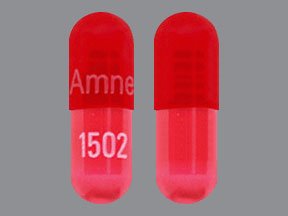Phenoxybenzamine Side Effects
Medically reviewed by Drugs.com. Last updated on Dec 19, 2024.
Applies to phenoxybenzamine: oral capsule.
Precautions
It is important that your doctor check your progress at regular visits to make sure that this medicine is working properly and to check for unwanted effects.
Do not take other medicines unless they have been discussed with your doctor. This especially includes over-the-counter (nonprescription) medicines for appetite control, asthma, colds, cough, hay fever, or sinus problems, since they may interfere with the effects of this medicine.
Phenoxybenzamine may cause some people to become dizzy, drowsy, or less alert than they are normally. This is more likely to happen when you begin to take it or when you increase the amount of medicine you are taking. Make sure you know how you react to this medicine before you drive, use machines, or do anything else that could be dangerous if you are dizzy or not alert.
Dizziness, lightheadedness, or fainting may occur, especially when you get up from a lying or sitting position. Getting up slowly may help, but if the problem continues or gets worse, check with your doctor.
The dizziness, lightheadedness, or fainting is also more likely to occur if you drink alcohol, stand for a long time, exercise, or if the weather is hot. While you are taking this medicine, be careful in the amount of alcohol you drink. Also, use extra care during exercise or hot weather or if you must stand for a long time.
Before having any kind of surgery (including dental surgery) or emergency treatment, tell the medical doctor or dentist in charge that you are using this medicine.
Phenoxybenzamine may cause dryness of the mouth, nose, and throat. For temporary relief of mouth dryness, use sugarless candy or gum, melt bits of ice in your mouth, or use a saliva substitute. However, if dry mouth continues for more than 2 weeks, check with your medical doctor or dentist. Continuing dryness of the mouth may increase the chance of dental disease, including tooth decay, gum disease, and fungus infections.
In rats and mice, phenoxybenzamine has been found to increase the risk of development of malignant tumors. It is not known if phenoxybenzamine increases the chance of tumors in humans.
Common side effects of phenoxybenzamine
Some side effects of phenoxybenzamine may occur that usually do not need medical attention. These side effects may go away during treatment as your body adjusts to the medicine. Also, your health care professional may be able to tell you about ways to prevent or reduce some of these side effects.
Check with your health care professional if any of the following side effects continue or are bothersome or if you have any questions about them:
More common side effects
- dizziness or lightheadedness, especially when getting up from a lying or sitting position
- fast heartbeat
- pinpoint pupils
- stuffy nose
Less common side effects
- confusion
- drowsiness
- dryness of mouth
- headache
- lack of energy
- sexual problems in males
- unusual tiredness or weakness
Serious side effects of phenoxybenzamine
Along with its needed effects, phenoxybenzamine may cause some unwanted effects. Although not all of these side effects may occur, if they do occur they may need medical attention.
See also:
For healthcare professionals
Applies to phenoxybenzamine: compounding powder, oral capsule.
Cardiovascular adverse events
Cardiovascular side effects have included postural hypotension and tachycardia. These symptoms are evidence of adrenergic blockade and vary according to the degree of blockade.[Ref]
Genitourinary
Genitourinary side effects have included inhibition of ejaculation. This symptom is indicative of adrenergic blockade and varies according to the degree of blockade.[Ref]
Respiratory
Respiratory side effects have included nasal congestion. This symptom is indicative of adrenergic blockade and varies according to the degree of blockade.[Ref]
Ocular
Ocular side effects have included miosis. This symptom is indicative of adrenergic blockade and varies according to the degree of blockade.[Ref]
Nervous system
Nervous system side effects have included drowsiness and fatigue.[Ref]
Gastrointestinal
Gastrointestinal side effects have included gastrointestinal irritation.[Ref]
References
1. "Product Information. Dibenzyline (phenoxybenzamine)." SmithKline Beecham
More about phenoxybenzamine
- Check interactions
- Compare alternatives
- Pricing & coupons
- Drug images
- Dosage information
- During pregnancy
- Drug class: miscellaneous cardiovascular agents
- En español
Patient resources
Other brands
Professional resources
Other brands
Related treatment guides
Further information
Phenoxybenzamine side effects can vary depending on the individual. Always consult your healthcare provider to ensure the information displayed on this page applies to your personal circumstances.
Note: Medication side effects may be underreported. If you are experiencing side effects that are not listed, submit a report to the FDA by following this guide.

